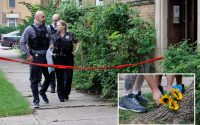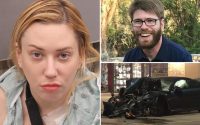NH woman ‘disgusted’ that dad’s body stolen from Harvard morgue
A New Hampshire woman whose parents donated their bodies to science said she was “disgusted” to find out her father’s remains were stolen from Harvard Medical School’s morgue in an alleged scheme to be sold on the black market – and demanded that her mother’s body be returned to the family.
“We were just disgusted — sick, like we were going to throw up,” Paula Peltonovich told the Boston Globe on Thursday. “It’s just unthinkable. There’s no words.”
She said her father Nicholas Pichowicz, who died in 2019 at the age of 87, and mother Joan Pichowicz, who died in March at age 86, had willed their bodies to the Ivy League school through its Anatomical Gift Program.
Her late parents had both been in law enforcement, her dad as a deputy sheriff in Rockingham County and her mom a police officer in Plaistow, WMUR reported.
“This is what they chose to do years ago,” Peltonovich, of Newton, New Hampshire, told the Globe about their decision to donate their remains. “They gave back to science.”

She said it was unclear if Harvard still has her mother’s remains.
“We want her returned, so we can bury her. We don’t even want them to cremate her,” the anguished woman told the paper.
Former med school morgue manager Cedric Lodge, 55, was among seven people charged in connection to an underground network that robbed corpses at Harvard and an Arkansas mortuary and crematorium.
He allegedly stole multiple remains — including those of two stillborn infants — and sold them online with the help of his wife, Denise, 63, between 2018 and March 7, according to federal prosecutors.
Another Newton family was also affected by the sprawling case.
Jack Porter told the Globe he received a letter from George Daley, dean of Harvard’s faculty of medicine, on Thursday saying his wife Raya’s remains “may have been impacted.”
Daley called the alleged crimes “reprehensible” and offered apologies “for the pain and uncertainty caused by this troubling news,” said Porter.
“I’m extremely upset,” he told the Globe. “First there was shock, and now it’s turning into a little bit of anger at Harvard. This kind of craziness is beyond belief.”
In a joint statement, Daley and Edward Hundert, the dean for medical education at the elite medical school, called the allegations a case of “abhorrent” betrayal.
“We are appalled to learn that something so disturbing could happen on our campus — a community dedicated to healing and serving others,” they told the paper in an email. “The reported incidents are a betrayal of HMS and, most importantly, each of the individuals who altruistically chose to will their bodies to HMS through the Anatomical Gift Program to advance medical education and research.”
Lodge and his wife were accused of selling the body parts to alleged associates Katrina Maclean, 44, Joshua Taylor, 46, and Matthew Lampi, 52.
One of Lampi’s clients, Jeremy Pauley, allegedly bought and sold body parts with him. Pauley eventually led authorities to Candace Chapman Scott, who is accused of stealing bodies slated for cremation in Little Rock and selling them to Pauley in Pennsylvania, officials said.
Many of the bodies Scott allegedly sold belong to those who donated them for scientific research purposes at the University of Arkansas Medical Sciences.
Experts said the shocking case sheds light on some people’s level of depravity in seeking a payoff.
“There is no limit to the prurient interests of the criminal mind,” Nora Cronin, an adjunct lecturer at the John Jay College of Criminal Justice, told the Globe. “Having worked in this field for a long time, nothing surprises me.”
She added: “When criminals see an opportunity to make a profit they will take it, no matter how exploitative it might be. To me it’s not surprising based on the types of exploitation I’ve seen,” including the trafficking of infants and toddlers.”
Sheldon Zhang, chairman of the School of Criminology and Justice Studies at the University of Massachusetts Lowell, said people can find human remains online but that the market is likely very limited.
“I can almost guarantee you that this is a very niche market with a very small group of buyers with some fetish,” Zhang told the outlet.
“It’s definitely not a common [form of] illicit contraband. This is very unique. Honestly I do not know, and I’m also not aware, of anyone in the [criminology] field who studies the trafficking of human remains,” he said.
The suspects face charges of conspiracy and the unlawful transportation of stolen goods, which carry a maximum of 15 years behind bars.


